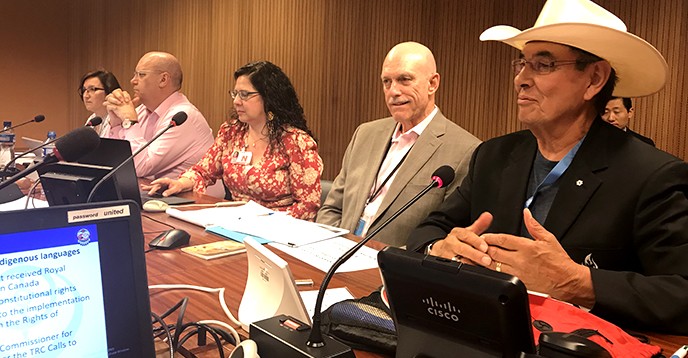
Building the legacy of the 2019 International Year of Indigenous Languages
news_190719_iyil.jpg

The 12th session of the Expert Mechanism on the Rights of Indigenous Peoples (EMRIP), which took place from 15 to 19 July in Geneva, Switzerland, celebrated the 2019 International Year of Indigenous Languages.
During the Opening Session, H.E Mr Coly Seck, President of the Human Rights Council, and Ms Mona Rishmawi, Chief of the Rule of Law, Equality and Non-Discrimination Branch, the Office of the UN High Commissioner for Human Rights (OHCHR), reaffirmed the full commitment of the Expert Mechanism to join global efforts for the implementation of the International Year by endorsing the proposal to proclaim a decade of indigenous languages.
The proclamation of a decade is strongly supported by a wide range of stakeholders. There is consensus that the decade would contribute to raise global awareness about the importance of indigenous languages for sustainable development, peace-building and reconciliation, and mobilize further resources for the support and promotion of indigenous languages worldwide.
Craig Ritchie, CEO of the Australian Institute and Torres Strait Islander Studies & Co-Chair of the Steering Committee for the organization of the International Year, noted: “As a Steering Committee, we have agreed to support to follow an International Decade of Indigenous Languages (…). But more than that, we need to give substance and focus to this agenda going forward”.
Aili Keskitalo, Co-Chair of the Steering Committee for the organization of the International Year of Indigenous Languages 2019, also emphasized how preserving and promoting indigenous languages requires a long-term strategy and joint commitment at different levels: “keeping our languages alive is the work of generations (…). Our languages are like sinews that ties us to our heritage and our ancestors; they might tear, but can be mended, with care, with love, and with lots of hard work”.
As expressed by Irmgarda Kasinskaite-Buddeberg, Programme Specialist, Communication and Information Sector at UNESCO, the IYIL2019 represents a unique opportunity for UNESCO, as lead agency for the implementation of the year, through the cooperation of multiple stakeholders, to mainstream a vision that linguistic rights are the integral component of human rights and fundamental freedoms: “a person’s freedom to use his or her language is a prerequisite to freedom of thought, freedom of opinion and expression, access to education and information, cultural expression, and other values in the Universal Declaration of Human Rights (…). We believe that it is key to unlock national strategic assets – indigenous languages – which have the potential to benefit humanity as a whole by providing original solutions to contemporary challenges”.
Progress made towards the implementation of IYIL2019 was discussed in the side-event organized by UNESCO and the Steering Committee of IYIL2019, that took place on 16 July 2019. Participants ranged from government representatives, indigenous peoples, UN Agencies representatives, researchers, activists, and experts in the area of indigenous languages. The discussions centered around existing normative frameworks for language protection, support and promotion, including the 4th Consolidated Report on the measures taken by UNESCO Member States on the implementation of the 2003 Recommendation concerning the Promotion and Use of Multilingualism and Universal Access to Cyberspace
Participants also reflected on latest developments in language policy-making in different countries, including Australia and Canada. Grand Chief Wilton Littlechild, Ms Valerie Galley Bellegarde, Member, Assembly of First Nations, and Mr Paul Joffe, a lawyer for the Grand Council of the Crees, presented the Indigenous Languages Act that recently received Royal Assent by the Canadian Government.
It was also stressed that it is important to invest in capacity-building activities, create further synergies, and mobilize new partners to concretely set the future path towards the revitalization and support of indigenous languages worldwide. As emphasized by Ms Marina Fedina, Director of the Centre of Innovative Language Technologies, Republic of Komi (Russian Federation), particular efforts should be made to support the application of latest technological developments to issues of internet accessibility for indigenous groups, as well as develop new technologies in lesser-used, minority and indigenous languages.
On the margins of the 12th EMRIP session, the members of the Steering Committee for the organization of the International Year engaged in discussions on the preparation of the Global Strategic Outcome Document, one of the key outcomes of the 2019 International Year, which would set the path for long-term plans in the area of indigenous languages. UNESCO is engaged in a series of regional consultations that aim to identify recommendations to be integrated in the document.
Learn more about the IYIL2019
- Action Plan: https://en.iyil2019.org/wp-content/uploads/2018/09/N1804802.pdf
- English: https://en.iyil2019.org/
- Français: https://fr.iyil2019.org/
- Español: https://es.iyil2019.org/
- Facebook: https://www.facebook.com/IYIL2019/ | @IYIL2019
- Twitter:https://twitter.com/IYIL2019
- Instagram:https://www.instagram.com/indigenouslanguages/
- Hashtags: #Indigenouslanguages; #WeAreIndigenous
